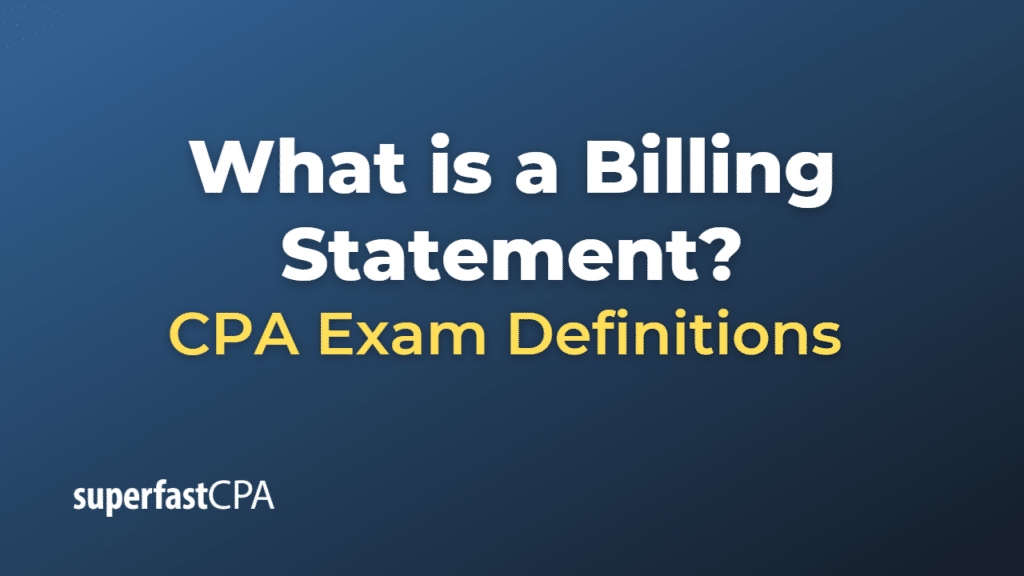Billing Statement
A billing statement, also known as an invoice or bill, is a financial document issued by a service provider or seller to a customer or buyer. It details the goods or services provided, the charges for those goods or services, any applicable taxes and fees, and the total amount due for payment. Billing statements are typically generated at the end of a billing cycle or upon completion of a transaction and serve as a formal request for payment.
Billing statements generally include the following information:
- Seller or service provider information: The name, address, and contact details of the company or individual providing the goods or services.
- Customer or buyer information: The name, address, and contact details of the person or entity responsible for making the payment.
- Invoice number or reference: A unique number or code assigned to the billing statement for tracking and record-keeping purposes.
- Date of issue: The date on which the billing statement is generated or issued.
- Billing period or transaction date: The time period covered by the billing statement (for recurring services) or the date of the transaction (for one-time purchases).
- Description of goods or services: A detailed list of the goods or services provided, along with the quantity, unit price, and any applicable discounts or promotions.
- Taxes and fees: A breakdown of any taxes, fees, or surcharges applicable to the transaction, such as sales tax, VAT, or shipping fees.
- Total amount due: The sum of all charges, taxes, and fees, which represents the total amount the customer owes to the service provider or seller.
- Payment terms and due date: The terms and conditions governing the payment, including the due date by which the customer must make the payment to avoid late fees or penalties.
- Payment methods: Accepted methods of payment, such as cash, check, credit card, or bank transfer, along with any relevant instructions or account details.
A billing statement serves as a formal record of a transaction and helps both the service provider or seller and the customer to track payments, manage finances, and resolve any disputes or discrepancies that may arise. In addition, billing statements are often used for tax and accounting purposes, as well as for providing proof of purchase in case of returns, exchanges, or warranty claims.
Example of a Billing Statement
Let’s consider a hypothetical example of a billing statement for an IT consulting firm, “TechGurus,” that has provided services to a client, “ABC Corporation.”
TechGurus has completed a project for ABC Corporation and now needs to issue a billing statement for the services rendered. The billing statement would include the following information:
- Seller or service provider information:
TechGurus Inc. 123 Tech Street, Silicon Valley, CA 94043
Phone: (555) 123-4567
Email: info@techgurus.com - Customer or buyer information:
ABC Corporation 456 Business Avenue, Silicon Valley, CA 94040
Phone: (555) 987-6543
Email: billing@abccorp.com - Invoice number or reference: TG-INV-1001
- Date of issue: April 21, 2023
- Billing period or transaction date: Project completion date – April 20, 2023
- Description of goods or services:
- IT consulting services for network infrastructure upgrade
- Total hours: 100
- Hourly rate: $150
- Taxes and fees:
- Sales tax (8.5%): $127.50
- Total amount due: $15,127.50 (100 hours x $150 per hour + $127.50 sales tax)
- Payment terms and due date: Net 30 days from the invoice date (payment due by May 21, 2023)
- Payment methods:
- Check payable to “TechGurus Inc.”
- Bank transfer: Account number – 123456789, Routing number – 987654321, Bank name – TechBank
In this example, the billing statement serves as a formal record of the transaction and a request for payment from TechGurus to ABC Corporation. It provides a detailed breakdown of the services provided, the charges for those services, and any applicable taxes. ABC Corporation can use this information to verify the charges, process the payment, and track their expenses, while TechGurus can use the billing statement to track their revenue and maintain accurate financial records.













